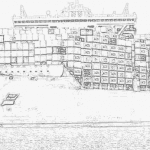The great French savant Renan contributed in 1864 an article to the Revue des Deux Mondes of Pans, in which he declared that Germany was doing in the intellectual sphere what England was doing in the political and that the German universities were the scene of an intellectual movement, which was the most fruitful flexible and varied that the history of the human intellect had ever seen, This was before Sadowa and Sedan and opinion in France has fluctuated according to the sway of political sentiment. But the essential feature of German universities as centres of research has generally been recognised, and when we speak of German academic ideals it is this point that we have to grasp—the peculiar German conception that the universities are the sole centres of academic research, literary and scientific. A university without a number of special Institutes attached to it for carrying on organised research and supplementing the usual university course is an anomaly accepted in India, but unthinkable in Germany.

University as Centre of Research
Paulsen in his well-known wcrk on the German universities (Die deutschcn Universitaten) points out that some of the most eminent scholars and thinkers of England, men like Darwin, Mill, Spencer, Carly1e, Macaulay, Gibbon, Bentham and others have stood outside the pale of the universities, and to these we may add Lord Haldane, Balfour, Edmund Gosse and others from contemporaries. In Germany, on the other hand, all who are university teachers are scholars, and vice versa, all who are scholars are university teachers. There are, indeed, exceptions: William and Alexander Humboldt were not professors, and among the school teachers there are some who have a reputation as scholars. Even among university professors there are some who have written nothing important and wish to be teachers rather than scholars. But continues Paulsen, the coincidence of the scholar with the professor is the general rule. “Whenever in Germany one speaks of a scholar, it is at once asked: in which university is he 7 …On the other hand, when one speaks of a professor, it is at once asked 1 what has he written, what has he accomplished in the domain of science ’?”
Scientific Academies
Next to the universities come the five scientific Academics dealing with all branches of knowledge—those of Berlin, Munich, Gottingen, Heidelberg and Leipzig, which are, however, more or less associations of professors belonging to various universities and often serve as centres for the intellectual cooperation of professors from neighbouring seats of learning. The academies often make grants for the publication of important works (Druckzuschuss), and their proceedings (Sitzungsberichtc) contain some of the most important investigations in the domain of higher learning in Germany, supplementing the scientific works published by the professors individually. The Academy of Berlin, founded by Leibniz in 1700, has to its credit some monumental publications among which may be cited the collections of Latin and Greek inscriptions, the edition of the works of the Arab historian Ibn Saud and specially the great collection of historical documents known as the Monumcnta Germaniac Historica (since 1826). The academies find at point of concentration in the Association (Verband) of the German Scientific Academies, which publishes a critical weekly, the well— known Deutsche Literaturzeitung. The united academies in conformity with their high mission have often undertaken works of universal importance, some of which are still in progress We may refer to the great Dictionary of the Latin language begun in 1893 and other monumental works like the Encyclopaedia of the mathematical sciences (since 1898) and the great Biographical and Literary Dictionary for Mathematics, Astronomy, Physics, Chemistry and the allied sciences (since 1863).
Technical High Schools
The Technical High Schools which are more or less universities are active centres of technical research. It may be noted that Heinrich Hertz made his famous experiments on the electric waves named after him during his tenure of professorship in the Technical High School at Karlsruhe. Research is former centralised under the guidance of university professors and distinguished scientists in the highly specialised technical Institutes belonging to the Kaiser William Society for the promotion of sciences mostly in Berlin, though there are some in other parts of Germany.
Teaching and Research
The ruling idea in Gennany on the subject of teaching and research is that the scientific researcher should also be a teacher and vice versa. From Luther and Melanchthon to Nietzsche and Rontgen, the vast majority of the foremost minds of Germany, including even poets and dramatists like Schiller, Burger and Freytag, has worked in a teaching capacity in the universities; and Paulsen points out that in the case of some like Fichte, Hegel and Schleiermacher, a great part of their works was published after their death from the sketches they had made for their lectures, or from the lecture notes of their students ; they owed their influence more to their lectures than to their writings.
The simple fact that a good researcher is not necessarily a good teacher is not overlooked, but the belief seems to be that a, really learned man cannot be a bad teacher. “The best scholar passes for the best teacher.” says Dr. Remme, a German scholar writing in 1928.
Academic Freedom
Research can flourish only in an atmosphere of freedom, and intellectual freedom is conditioned by administrative autonomy. The great classical scholar Emst Curtius remarked in his rectorial address in the University of Berlin in 188l that “science can make its way in all directions only when left to itself.” Hermann Helmholtz points out that in German Universities “the most extreme consequences of materialistic philosophy and the boldest speculations in the field of Darwin’s theory of evolution can be put forward in public lectures with as much freedom as the most extreme exaltation of the infallibility of the Pope.” Helmholtz mentions the well known case of Renan in France and says that it would be extremely risky for a lecturer in an English University to set forth anything against the dogmas of the Church of England, To us in India the existence side by side of Faculties of Catholic and Protestant Theology in some German Universities is not without its lesson. But the doctrine of the freedom of teaching is sometimes carried to extreme lengths, and in this connection we may refer to the Social-democratic demand for parallel professorships for the interpretation of diverse outlooks on life (Weltanschauung).
Administrative autonomy is assured by the fact that the Rector who is our Chancellor and Vice~Chancellor combined and elected annually by the professorial body, carries on the administration with the help of the Senate, which is a committee of professors, With regard to the appointment of teachers, the unpaid Privat-dozents who are admitted by the University on its own authority become ultimately professors. but the appointment of a professor, before it is valid, requires the approval of the State.
Autonomy in the University
The administrative autonomy of German Universities is not greater than that of English Universities, but they enjoy a greater measure of freedom than those of France. In 1925 the students of the Faculty of Law in the University of Paris made demonstrations against a professor appointed by the Minister of Education who was accused of favouritism. The Minister ordered certain disciplinary measures which were not adopted by the Dean, as a result of which the latter was suspended. Cases like this would hardly be possible in a German University.
 The academic freedom of German Universities has, however, been criticised on the ground that the Universities were for decades a hotbed of militarism, and the free thinking of the students was hampered by the strong national and political prejudices of the majority of the professors, Ulrich von Wilamowitz, Germany’s most famous Greek scholar, in his new year’s speech in the University of Berlin in 1903, indeed described the Prussian army “as the national high school” and saw in the education provided by the army the indispensable factor that made an educational system complete, Devotion to the ideal of Prussian militarism was no doubt deep rooted in academic circles, though it was the inevitable lesson conveyed by the whole history of the unification of Germany in the 19th century. Besides, it sometimes so happens that where the tyranny of the State does not exist, the tyranny of the guild makes itself a reality. It is said that in 1922 Professor Nikolai of Berlin was compelled by the senate to resign on account of his pacifist opinions. The unseemly conduct of the nationalist students of the Technical High School at Hanover in 1926 when t.hey rebelled against the radical professor of philosophy in spite of the wholesale condemnation of the Liberal Press may be regarded as another instance oi what we have called the tyranny of the guild, though no doubt such instances are extremely rare. Put in criticising the militarism or national egoism of German academic circles, we must not forget the imperialist views of many professors in English Universities, and imperialism when it is a reality is nothing more than militarism in disguise.
The academic freedom of German Universities has, however, been criticised on the ground that the Universities were for decades a hotbed of militarism, and the free thinking of the students was hampered by the strong national and political prejudices of the majority of the professors, Ulrich von Wilamowitz, Germany’s most famous Greek scholar, in his new year’s speech in the University of Berlin in 1903, indeed described the Prussian army “as the national high school” and saw in the education provided by the army the indispensable factor that made an educational system complete, Devotion to the ideal of Prussian militarism was no doubt deep rooted in academic circles, though it was the inevitable lesson conveyed by the whole history of the unification of Germany in the 19th century. Besides, it sometimes so happens that where the tyranny of the State does not exist, the tyranny of the guild makes itself a reality. It is said that in 1922 Professor Nikolai of Berlin was compelled by the senate to resign on account of his pacifist opinions. The unseemly conduct of the nationalist students of the Technical High School at Hanover in 1926 when t.hey rebelled against the radical professor of philosophy in spite of the wholesale condemnation of the Liberal Press may be regarded as another instance oi what we have called the tyranny of the guild, though no doubt such instances are extremely rare. Put in criticising the militarism or national egoism of German academic circles, we must not forget the imperialist views of many professors in English Universities, and imperialism when it is a reality is nothing more than militarism in disguise.
Nature of Research and Analytic Method
Academic freedom is but a means to an end, and that end is research, Ernst Cuttius in his rectorial address emphasised the importance of a preliminary training : “the habit of methodical work, precision in the use of the auxiliary material at the disposal of the various sciences—mathematical training for the exact sciences, accurate linguistic and literary knowledge in the case of historical and philological studies.” He points out that the assimilation of the whole mass of materials is the only guarantee of solid progress, and refers to Fichte‘s idea that a true study is that “which does not avoid difficult spots or hate the dry and the tedious”. A study of this type is “the best barrier against dilettantism, which plays with the fancy and wants to gather fruits without having ploughed the soil”. This shortly speaking, is the ideal of German research, while the analytic method is its handmaid: both combined have made German scientific investigations models minute and painstaking research. Curtius has, indeed, described research as a “handicraft” involving intelligence as well as drudgery. The analytic method is essentially objective; “the artist gives the material a higher being, the researcher finds in it the true being”
The analytic method necessarily leads to the synthetic method, but before we speak of it we must refer to Nietzsche’s severe criticism of German academic ideals and methods. Nietzsehe’s Criticism and Synthetic Method The wholesale condemnation by Nietzsche of German education and science, coming as it did from one who was himself a university professor, was no doubt staggering, but the philosopher did not suggest any definite method, and as a matter of fact, was too metaphysical to do so. He denounced the analytic tendencies of his times and laid stress on the creative side of the human intellect, on genius as opposed to learning or scholarship. and sought to replace historical thinking by metaphysical thinking. So, in his “Wir Gelehrten” he pities the scholar, who is nothing more than a mirror and has become merely “the thoroughfare (Durehgang) and reflection of foreign forms and occurrences.” With his eye on the dynamic force of character, on will power and personality he heaps scom on “objectivity”, “scientificness”, “art for art”, and “mere knowledge devoid of will.” ln his “Vom Nutzen and Nachteil der Historie” he declares that “a great scholar and a great blockhead (Flachkopf) go together very easily under the same hat”, and that the absorption of knowledge without will power and creative genius gives a feeling similar to that of “those serpents which swallow a whole rabbit and then lying quietly in the sun avoid all movements except those which are indispensable.”
Nietzsche’s criticism and teaching contained elements of abiding value for the future of human education but did not influence the course of German research and learning to any great extent. He no doubt admitted the utility of “philosophical workers” gathering materials for the law—giving philosopher and that of historical workers as “handymen in the service of the master historian”, who in the exertion of his own noblest qualities guesses what is great and worth knowing in the paste He gave importance to “synthetic productions”, but the synthetic method which has appeared in Germany as a necessary adjunct of the method of analysis docs not and possibly cannot fulfil the idea of Nietzsche, a prophetic sweep and a synthetic vision mastering the past and ” shortening Time itself. “
As a student of literature, I will not venture to speak of science, but so far as literary research is concerned, in the field of German literature itself the extreme analytic method of Lachmann and Scherer has been followed by the synthetic studies of Jakob Minor, Dilthey and others, who along with Richard Meyer, Walzcl and Gundolf among contemporaries, have fruitfully applied the psychological and aesthetic methods to the — interpretation of the spirit and history of literature, In the field of historical research also the importance of the judgement of values as opposed to a mere collection and arrangement of facts has been in recent times emphasised. Prof. Georg von Below in his masterly survey of German historical literature Ends the purely objective method in sufficient and points out the importance of discerning values, which is possibly only by the subjective method.
There are, however, distinguished scholars, who suspect any method involving wide generalisations and subjective interpretations. Konrad Burdach, the great modem authority on the Renaissance, has, for instance expressed his misgivings regarding such topics as the philosophy of history or the discernment of values. He advocates the analytic method, which avoids “abstractions and constructions” and occupies itself with the concrete truth and “the manifold character and divergence of individual creative forces.” This predilection for minute study and analysis may be said to characterise German scholarship at its best*.
K.K. Handique
(* Published in Forward, 11 March 1928)
Krishna Kanta Handique was a Sanskrit scholar, an Indologist and philanthropist from Assam. He was a recipient of the civilian honour of the Padma Shri and Padma Bhushan Krishna Kanta Handique was born on July 20, 1898 in a Tai-Ahom family in Jorhat town of Assam, to Rai-Bahadur Radha Kanta Handique




Leave a Reply